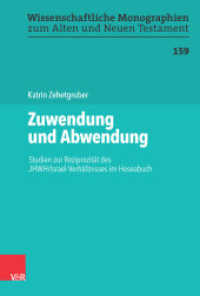- ホーム
- > 洋書
- > 英文書
- > Religion / Ethics
Full Description
Mobilizing Mainstream Islam explains the rise and changing shape of religious nationalism in Indonesia after the fall of Suharto in 1998. In the 2000s, a time of electoral democratization, Indonesia's religious and political landscape experienced significant competition and reshuffling as religious and political elites formed an alliance to challenge Indonesia's official policies of tolerance and religious pluralism. As Saskia Schäfer argues, state and religious authorities have in the post-Suharto era constructed a homogenized, bureaucratized form of Islam—which she terms "Mainstream Islam"—that deliberately marginalizes people framed as minorities, such as Ahmadiyya, Shia Muslims and LGBTQI people, through securitization and theological delegitimization. She shows how the discourses of human rights have only sharpened the contours of these identities within the national imaginary.
Through diverse case studies, Mobilizing Mainstream Islam explores how competitive electoral politics, decentralization, and media fragmentation facilitated the emergence of Islamist majoritarian rule, and compares Indonesia's decentralized model with Malaysia's state-driven approach. Schäfer examines how competition over resources and public support shape religious nationalism. As the case of Indonesia illuminates broader global trends of religious nationalism, this book offers fresh insights into the challenges of maintaining pluralism in electoral democracies.





